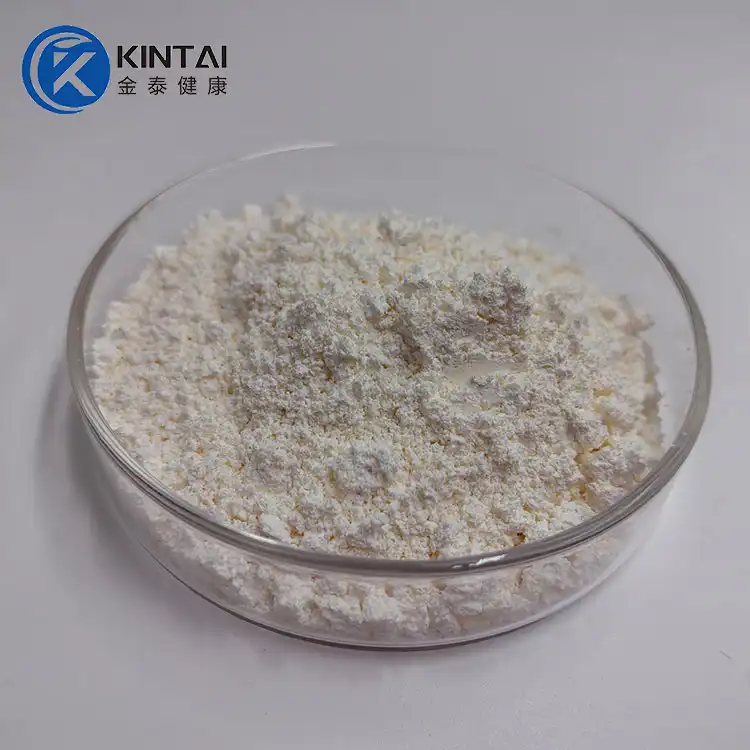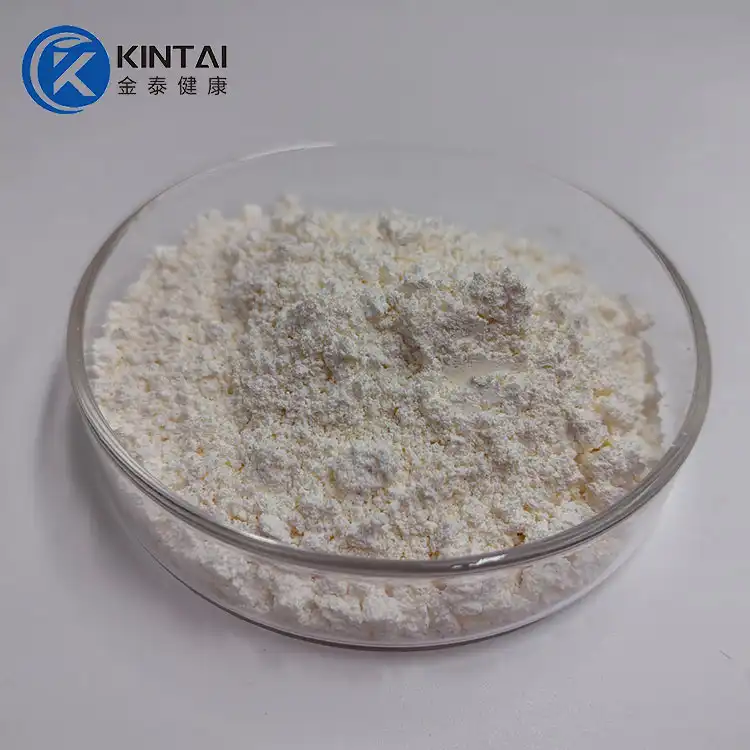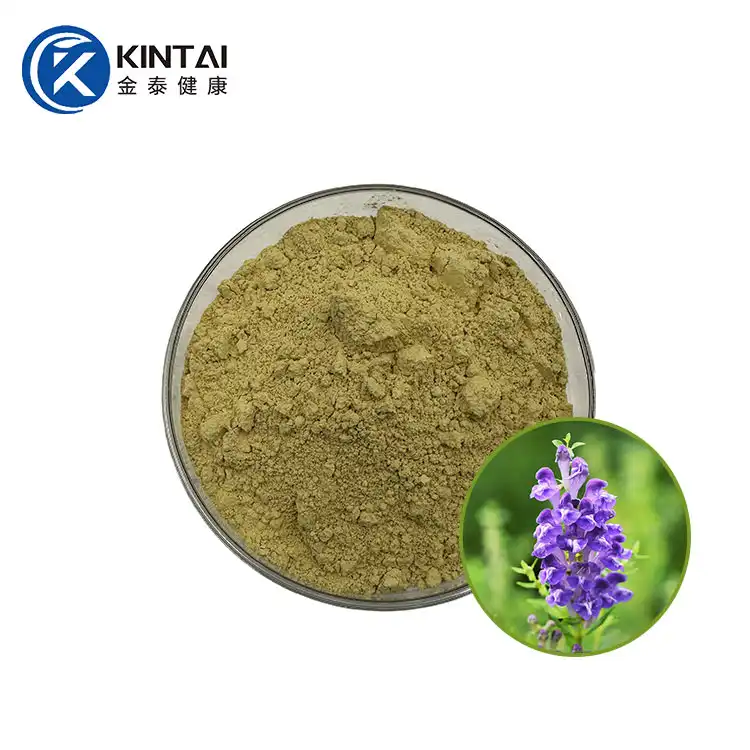Berberine Chloride | 98% Purity | Kintai Phytochem
CAS No.: 633-65-8
Molecular Formula: C₂₀H₁₈ClNO₄
Purity: ≥98% (HPLC)
Appearance: Bright yellow powder
Certifications: ISO, HACCP, HALAL, KOSHER, Technical Invention Patent Certificate
MOQ: 1KG
Sample: Free sample available
Production Capacity: 2000KG/month
Delivery Time: Delivery within one day from warehouse
Shelf Life: Two years
Payment: Multiple terms acceptable like T/T, LC, DA
Company Advantage:Kintai mainly focuses on the production of high-content plant extracts and pharmaceutical intermediates all year round.
- Fast Delievery
- Quality Assurance
- 24/7 Customer Service
Product Introduction
Product Details
What is Chemically Synthesized Berberine Chloride
Kintaihealth® is a leading biotechnology manufacturer specializing in the advanced chemical synthesis of high-purity active ingredients, including Berberine Chloride. Unlike traditional plant extraction methods, Kintaihealth®'s chemically synthesized Berberine Chloride is produced through a patented, eco-friendly organic synthesis process, ensuring superior purity (≥98%), batch-to-batch consistency, and compliance with international pharmacopeial standards (USP/EP). By eliminating reliance on botanical sources, Kintaihealth® overcomes limitations such as seasonal variability, pesticide residues, and supply chain instability, while adhering to GMP, ISO, and green chemistry principles for sustainable production.

Berberine Chloride Specifications
|
Field |
Details |
|
|---|---|---|
|
Product Name |
Berberine Hydrochloride |
|
|
Batch No. |
C103922505012 |
|
|
Production Date |
2025.05.27 |
|
|
Expiration Date |
2027.05.26 |
|
|
Quantity |
68.85 kg |
|
|
Packing Specification |
Intermediate pharmaceutical |
|
|
Report No. |
BG-FP-2506-014 |
|
|
Report Date |
2025.06.13 |
|
|
Record No. |
REC-SMPQC015-01(04) |
|
|
Inspection Basis |
STPQC(C1039012)(C7) |
|
|
Appearance |
Yellow crystalline powder |
|
|
Water |
≤12.0% |
9.3% |
|
Residue on Ignition |
≤0.1% |
<0.1% |
|
Heavy Metal |
≤20 ppm |
Conforms |
|
Single Impurity |
≤2.0% |
0.4% |
|
Total Impurities |
≤3.0% |
1.1% |
|
Assay (HPLC) |
98.0%~102.0% (anhydrous basis) |
99.2% |
Features and Advantages of Chemically Synthesized Berberine Chloride
1.Exceptional Uniformity in Quality
Chemically synthesized berberine chloride is characterized by remarkable consistency in both chemical composition and biological activity. Through precisely controlled synthetic reactions—including optimized reagent ratios, reaction temperatures, and purification steps—each batch achieves a purity level of over 99%, with minimal variation in impurity profiles. This stands in contrast to naturally extracted berberine chloride, which can fluctuate in potency due to factors like plant growth conditions and extraction methods. Such uniformity ensures reliable dosing in pharmaceutical formulations, a key factor in maintaining consistent therapeutic effects, whether for treating intestinal infections or regulating metabolic disorders.
2.High Scalability and Economic Viability
Synthetic production of berberine chloride offers superior scalability, with industrial processes capable of generating large quantities efficiently. Advanced synthetic routes, often with yields exceeding 85%, allow manufacturers to meet high-volume demands across industries, from pharmaceuticals to veterinary care. The streamlined nature of chemical synthesis also reduces production costs: standardized raw materials, recyclable catalysts, and automated reaction systems lower per-unit expenses compared to natural extraction, which relies on costly plant cultivation and complex purification. This cost efficiency makes berberine chloride more accessible for mass-market applications, benefiting both producers and end-users.
3.Enhanced Safety and Sustainability
Modern synthetic methods for berberine chloride prioritize safety and environmental responsibility. Rigorous process controls minimize the presence of toxic by-products, such as heavy metals and residual solvents, ensuring compliance with strict safety thresholds. Additionally, synthetic production reduces dependence on agricultural resources needed for cultivating berberine-containing plants, mitigating deforestation and water usage associated with large-scale farming. Advanced technologies like solvent recovery systems and energy-efficient reactors further reduce the environmental footprint, aligning with global trends toward sustainable chemical manufacturing.

Conformance to International Standards
Chemically synthesized berberine chloride adheres to a set of globally recognized standards, validating its quality and safety for international markets:
·USP (United States Pharmacopeia): Complies with USP specifications for berberine chloride, which include limits on related substances (≤0.5%), heavy metals (≤10 ppm), and moisture content (≤5%). These standards ensure the compound is free from harmful impurities and maintains stability during storage and use.
·EP (European Pharmacopoeia): Meets EP requirements, including stringent microbial testing (total viable aerobic count ≤10³ CFU/g) and residual solvent limits (in accordance with ICH Q3C guidelines). This ensures suitability for use in European pharmaceutical products, where strict regulatory oversight governs ingredient safety.
·WHO International Pharmacopoeia: Aligns with WHO standards for identity, purity, and potency. Tests such as ultraviolet-visible spectroscopy (UV-Vis) and high-performance liquid chromatography (HPLC) confirm the chemical structure and concentration of berberine chloride, ensuring it meets the criteria for use as an active pharmaceutical ingredient (API) in global health initiatives.
By conforming to these international standards, chemically synthesized berberine chloride establishes itself as a trusted, high-quality compound, facilitating its use in diverse global markets and ensuring consistent performance in therapeutic and industrial applications.
Interested? We'd love to send you a free Sample!
Benefits of Chemically Synthesized Berberine Chloride
·High Purity and Consistency:
Kintaihealth® has mastered the art of chemical synthesis, allowing for pinpoint control during the production of berberine chloride. Their advanced manufacturing processes are designed to filter out even the most minute impurities, be it leftover plant extracts, heavy metals, or other organic contaminants that might lurk in naturally sourced counterparts. The berberine chloride produced by Kintaihealth® is of such high purity that it guarantees consistent and reliable biological activity. This is a game-changer in pharmaceutical applications, where the slightest deviation in dosage accuracy can impact therapeutic efficacy. For drugs formulated with Kintaihealth®'s berberine chloride, patients can expect a more predictable response. Furthermore, the standardized composition from batch to batch simplifies quality control procedures, ensuring that every product meets the stringent regulatory benchmarks set by the industry.
·Scalable Production and Cost-Effectiveness:
Kintaihealth®'s synthetic approach to berberine chloride production sets it apart from traditional natural extraction methods. While natural extraction depends on berberine-rich plants like Coptis chinensis, which are subject to seasonal fluctuations, climate whims, and variable agricultural yields, Kintaihealth®'s chemical synthesis pathway is stable and scalable. The company can ramp up or down production volumes in response to market demand, free from the constraints of raw material shortages. This scalability not only ensures a steady supply but also unlocks cost savings. Through continuous process optimization, Kintaihealth® has streamlined its synthetic procedures, reducing the per-unit cost significantly compared to the laborious and resource-intensive natural extraction methods. This cost-effectiveness makes high-quality berberine chloride more accessible across various industries, from pharmaceuticals to nutraceuticals.
·Reduced Environmental and Ecological Impact:
In an era of growing environmental consciousness, Kintaihealth®'s chemically synthesized berberine chloride stands as an eco-friendly alternative. The natural extraction process often leads to overharvesting of medicinal plants, causing habitat degradation and a decline in biodiversity. Kintaihealth® eliminates this threat by relying on chemical synthesis, eliminating the need for large-scale plant cultivation or wild harvesting. Moreover, the company adheres to green chemistry principles in its manufacturing processes. They explore the use of renewable feedstocks and fine-tune reaction conditions to minimize waste generation and lower energy consumption, slashing emissions in the process. By choosing Kintaihealth®'s berberine chloride, industries can contribute to a more sustainable future, aligning with global initiatives that advocate for environmentally responsible manufacturing.

How Chemically Synthesized Berberine Chloride Differs from Natural Berberine
|
Aspect |
Chemically Synthesized Berberine Chloride (e.g., Kintaihealth®) |
Natural Berberine |
|
Source |
Produced through controlled chemical reactions in laboratories or manufacturing facilities, using synthetic precursors. |
Extracted from berberine-containing plants such as Coptis chinensis, Berberis vulgaris, or Hydrastis canadensis. |
|
Purity |
Typically achieves high purity (often >99%) with minimal impurities, as the synthesis process allows precise control over contaminants like heavy metals, residual plant compounds, or by-products. |
May contain impurities such as other alkaloids, plant pigments, or residual pesticides from the source plants, requiring additional purification steps to meet high standards. |
|
Composition Consistency |
Batches are highly consistent in chemical structure and concentration, as synthesis parameters are standardized and reproducible. |
Composition can vary between batches due to factors like plant species, growing conditions, harvesting time, and extraction methods, leading to fluctuations in potency. |
|
Production Dependence |
Independent of natural resources; production volume is scalable based on demand, with no reliance on agricultural yields or seasonal availability. |
Dependent on the supply of berberine-rich plants, which are subject to climate changes, pests, and land availability, potentially causing supply shortages. |
|
Environmental Impact |
Reduces pressure on natural plant populations by avoiding overharvesting; modern synthesis (e.g., Kintaihealth®) often incorporates green chemistry practices to minimize waste and energy use. |
May contribute to deforestation or habitat loss if plants are overcollected; extraction processes can generate more waste and consume more water/energy compared to optimized synthetic methods. |
|
Regulatory Compliance |
Easier to standardize for regulatory approval, as purity and composition are consistent, simplifying quality control and documentation for pharmaceutical or nutraceutical use. |
Requires rigorous testing to account for batch variability, making regulatory compliance more complex due to potential fluctuations in impurity levels. |
Interested? We'd love to send you a free Sample!
Applications of Berberine Chloride in Modern Medicine
1.Pharmaceutical Therapeutics:
Chemically synthesized berberine chloride is widely utilized in modern medicine for its antimicrobial, anti-inflammatory, and metabolic-regulating properties. It is commonly prescribed as an adjunct therapy for gastrointestinal infections, particularly those caused by bacteria like E. coli and Shigella, due to its ability to inhibit microbial growth. Additionally, its role in managing type 2 diabetes has gained attention, as it helps improve insulin sensitivity and reduce blood glucose levels. The high purity and consistent potency of synthetic berberine chloride ensure precise dosing, making it a reliable component in formulations for chronic disease management.
2.N utraceutical Supplements:
In the (nutraceutical) industry, synthetic berberine chloride is a popular ingredient in supplements targeting metabolic health, weight management, and cardiovascular support. Its standardized composition allows for accurate labeling of active ingredients, ensuring consumers receive consistent benefits. Unlike natural extracts, which may vary in potency, synthetic berberine chloride supplements offer predictable effects, such as aiding in lipid metabolism to lower cholesterol levels. These supplements are often marketed to health-conscious individuals seeking evidence-based support for maintaining overall wellness.
3.Cosmeceutical Formulations:
The cosmetic industry leverages the antimicrobial and antioxidant properties of chemically synthesized berberine chloride in skincare products. It is incorporated into formulations such as acne treatments, facial cleansers, and anti-aging serums to combat acne-causing bacteria, reduce skin inflammation, and neutralize free radicals that contribute to premature aging. The purity of synthetic berberine chloride minimizes the risk of skin irritation from impurities, making it suitable for sensitive skin formulations. Its stability in various cosmetic bases also ensures long shelf life, enhancing the effectiveness of these products.
The Science Behind Chemically Synthesized Berberine Chloride Production
-

Interested? We'd love to send you a free Sample!
Why Choose Chemically Synthesized Berberine Chloride Over Natural Extracts?
1.Superior Stability and Consistent Efficacy:
Chemically synthesized berberine chloride exhibits exceptional stability under various storage conditions, including temperature fluctuations, light exposure, and humidity. Its molecular structure, produced through controlled chemical reactions, resists degradation over time, ensuring a longer shelf life and reliable potency. In contrast, natural berberine extracts often contain impurities and residual plant compounds that can accelerate degradation, leading to inconsistent efficacy—batch-to-batch variations in potency are common due to factors like plant maturity, extraction methods, and post-harvest handling. For pharmaceutical and nutraceutical applications, this stability is critical: synthetic berberine chloride guarantees that each dose delivers the same therapeutic effect, eliminating the risks of underdosing or overdosing associated with natural extracts.
2.U nmatched Scalability and Supply Reliability:
Natural berberine extraction depends entirely on the availability of berberine-rich plants, which are vulnerable to seasonal changes, climate disasters, pests, and agricultural market fluctuations. A single poor harvest can disrupt supply chains for months, causing shortages and price spikes. Chemical synthesis, by contrast, offers unlimited scalability: manufacturers can adjust production volumes based on demand, from kilograms to tons, using readily available raw materials and standardized industrial processes. This independence from agricultural constraints ensures a steady, uninterrupted supply—critical for industries like pharmaceuticals, where consistent access to active ingredients is non-negotiable. For example, Kintaihealth® leverages this scalability to meet global demand without relying on crop yields, providing partners with predictable supply timelines.
3.Cost-Effectiveness and Red uced Total Expenses:
While natural extraction involves high costs in plant cultivation, harvesting, and labor-intensive purification (to remove impurities), chemical synthesis optimizes efficiency through automated processes and raw material recycling. Large-scale synthetic production drives down per-unit costs significantly—studies show that synthetic berberine chloride can be 30-50% cheaper than high-purity natural extracts when produced in bulk. Additionally, the consistency of synthetic products reduces quality control and testing expenses: manufacturers avoid the repeated assays needed to validate variable natural batches. Over time, these savings translate to lower costs for downstream products, making synthetic berberine chloride a more economical choice for both producers and consumers, without compromising on quality or efficacy.

Quality Standards and Safety of Chemically Synthesized Berberine Chloride
Compliance with Pha rmacopoeial Standards
·USP (United States Pharmacopeia): Meets USP monograph requirements, including purity (≥98.0%), loss on drying (≤10.0%), and residue on ignition (≤0.1%).
·EP ( European Pharmacopoeia): Conforms to EP standards, with strict limits on related substances (individual impurities ≤0.5%, total impurities ≤1.0%) and heavy metal content (≤10 ppm for lead, cadmium, mercury, and arsenic).
·CP (Chinese Pharmac opoeia): Complies with CP specifications, such as assay (≥97.0% calculated on the dried basis) and microbial limits (total aerobic microbial count ≤1000 CFU/g, no pathogenic bacteria detected).
Safety Assurance
·Toxicological Studies: Supported by preclinical data showing no acute toxicity at therapeutic doses; long-term studies indicate no carcinogenic, mutagenic, or teratogenic effects when used as directed.
·Im purity Control: Advanced purification processes ensure levels of genotoxic impurities (e.g., nitrosamines) are below 1 ppm, adhering to ICH M7 guidelines.
·Stability Testing: Maintains stability u nder accelerated conditions (40°C/75% RH for 6 months) and long-term storage (25°C/60% RH for 24 months) without significant degradation or potency loss.
Regulatory Comp liance
·F DA (U.S. Food and Drug Administration): Eligible for use in pharmaceutical products with FDA approval, meeting cGMP (current Good Manufacturing Practice) requirements for production facilities.
·EMA (Eu ropean Medicines Agency): Complies with EMA guidelines for active pharmaceutical ingredients (APIs), including documentation of manufacturing processes and quality control data.
·Local Reg ulatory Bodies: Approved by health authorities in major markets (e.g., China NMPA, Japan PMDA), with complete dossiers submitted for registration and post-marketing surveillance.

About Us
OEM and ODM Services
KINTAI is a professional pro-xylane manufacturer and supplier. We offer OEM and ODM administrations to take care of the particular necessities and prerequisites of our clients. Our group of specialists can foster modified items and offer coordinated support arrangements.
Our Certifications
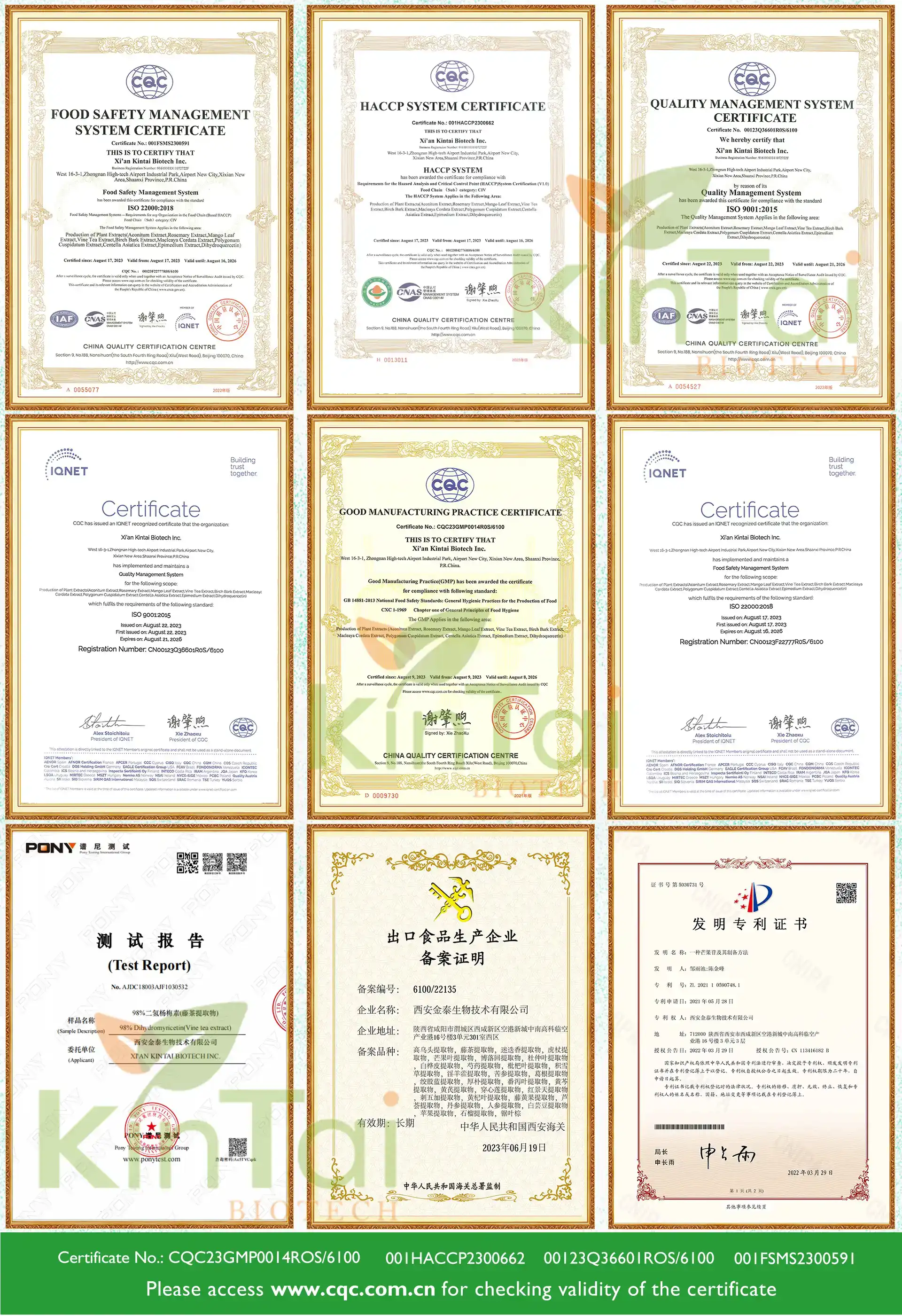
KINTAI Advantages

Parcel and Shipping
1> 1KG/bag, 10KG/carton,25kg/drum
2> By Express: Door to door; DHL/FEDEX/EMS; 3-4DAYS; Suitable for under 50kg; high cost; easy to pick up the goods
3> By Air: Airport to Airport; 4-5 days; Suitable for more than 50kg; high cost;professional broker needed
4> By Sea: Port to Port; 15-30days; Suitable for more than 500kg; Low cost; professional broker needed

Send Inquiry
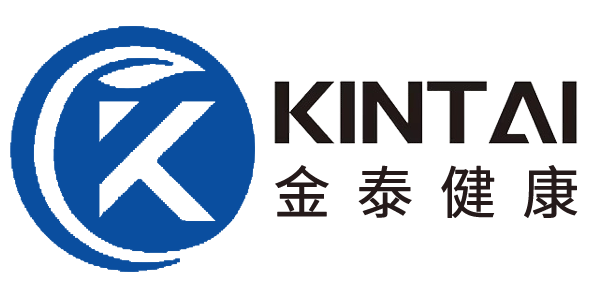

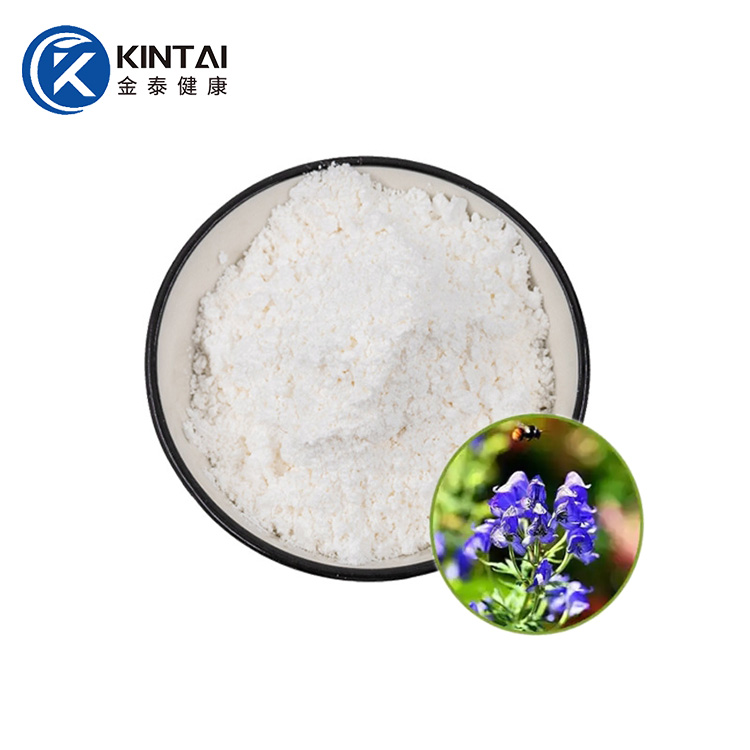

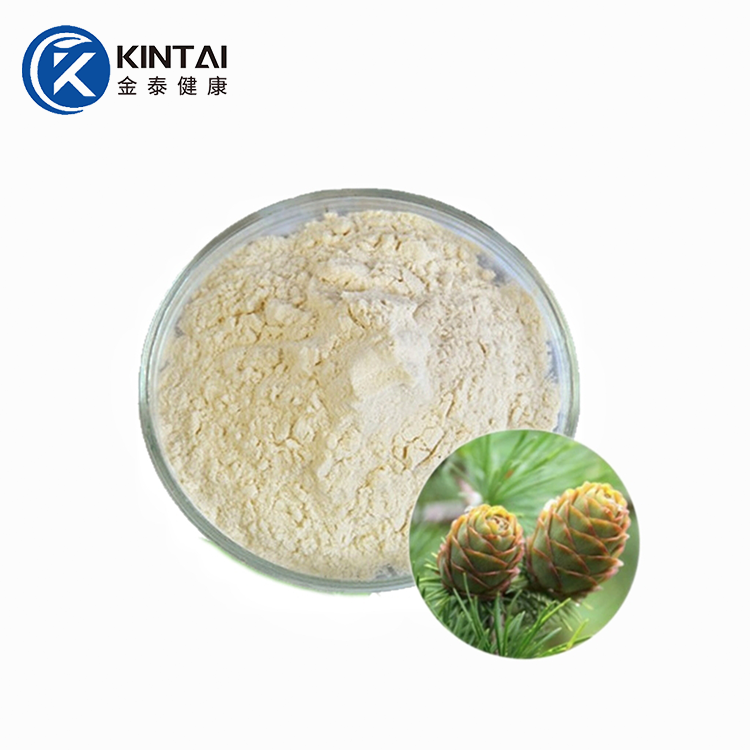
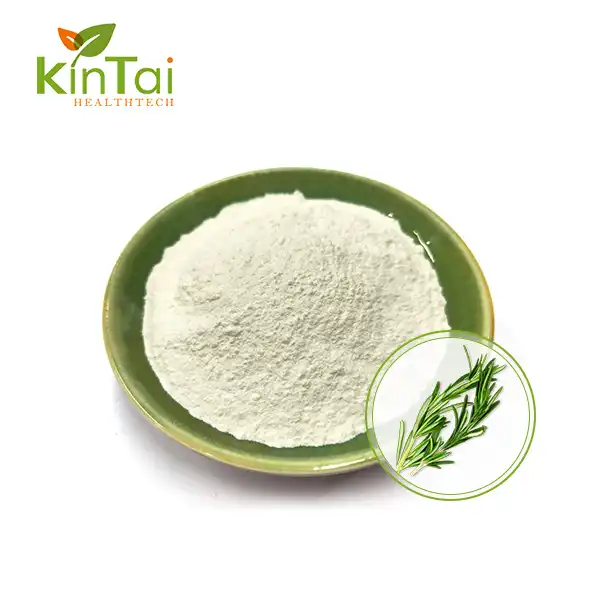
_1757043784560.jpg)
